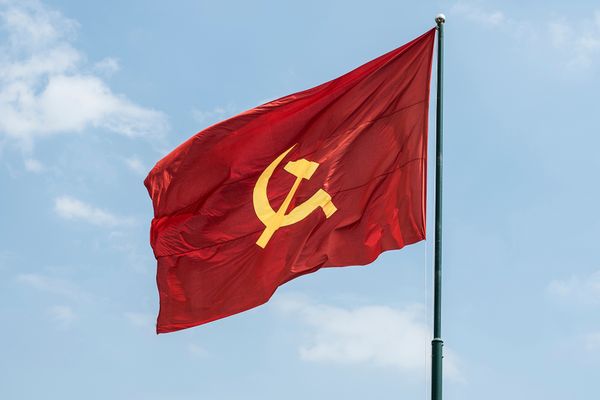2.1.2
China & Taiwan
The Widening of the Cold War
The Widening of the Cold War
The creation of the People's Republic of China sent deep fear through the West. The West was worried because it was clear that communism was spreading.


The People's Republic of China
The People's Republic of China
- By 1949, Germany had been divided into West and East Germany.
- The division of Germany marked the start of the Cold War.
- The situation was made worse when China had a successful Communist Revolution.
- The Communist Revolution meant China became the People’s Republic of China.


Further spread of communism
Further spread of communism
- This situation was made worse by two events:
- China made a military alliance with the USSR in February 1950.
- North Korea (which was also communist) invaded South Korea in June 1950 causing the Korean War.


Increased spending in the US
Increased spending in the US
- The USA began to spend more money on its military and intelligence services due to the increase of communist power in the East.


Shifts in US foreign policy
Shifts in US foreign policy
- US foreign policy shifted following a report from the National Security Council. US foreign policy changed to:
- Help Japan to recover after WW2.
- Assist all anti-communist governments in the East (including South Korea and the Right-Wing Nationalist Jiang Jieshi in Taiwan).
NSC-68 April 1950
NSC-68 April 1950
The National Security Council Resolution (NSC-68) was a top-secret document that laid out the American national security strategy.


The creation of NSC-68
The creation of NSC-68
- The NSC-68 was created in April 1950.
- In 1949 the communists had secured victory in China and in the same year, the USSR successfully detonated an atom bomb.
- The NSC-68 stated that the USA should increase its military spending by using more money from US taxation and become committed to helping to secure the East.
- It also advocated the build-up of American conventional and nuclear weapons.
- Despite the increase in military spending and readiness, the NSC-68 did not advocate a preventative war as the USA did not want to provoke the USSR.
Other points in NSC-68
Other points in NSC-68
- NSC-68 also stated that maximum strain should be placed on the Soviet Structure of power and particularly on the relationships between Moscow and the satellite states.
- Another recommendation was that the American people should be kept fully informed and cognizant of the threats to national security so that they can support the actions of the US government.
- NSC-68 was not welcomed by all in the US but it was adopted in full at the outbreak of the 1950 Korean War.


Primary evidence
Primary evidence
- The NSC-68 stated that: ‘The United States must have substantially increased air, ground and sea strength, atomic capabilities and air and civilian defences to deter war’. It also stated that ‘we must strengthen orientation towards the United States of the non-Soviet nations; and help such of those nations as are able and willing to make an important contribution to US security to increase their economic and political stability and their military capability’
1Origins of the Cold War, 1945-9
1.1Events of 1945
1.2The Collapse of the Grand Alliance
1.3Developing Tensions
1.4US Involvement in Europe
2Widening of the Cold War
2.1US Containment in Asia
2.2The Korean War
2.3Increasing Cold War Tensions, 1949 -1953
3The Global War
3.2Cold War Rivalries
3.3Conflict in Asia
3.4Confrontation Between Superpowers
4Confrontation & Cooperation
4.2Cooperation
4.3Pressures on the USSR
5Brezhnev Era
5.1Detente
5.2Second Cold War
5.3Developments in Africa & Americas
6Ending of the Cold War
6.1Gorbachev
6.2Cooperation between US & USSR
6.3Collapse of Communism in Eastern Europe
6.4End of Tensions Across the World
Jump to other topics
1Origins of the Cold War, 1945-9
1.1Events of 1945
1.2The Collapse of the Grand Alliance
1.3Developing Tensions
1.4US Involvement in Europe
2Widening of the Cold War
2.1US Containment in Asia
2.2The Korean War
2.3Increasing Cold War Tensions, 1949 -1953
3The Global War
3.2Cold War Rivalries
3.3Conflict in Asia
3.4Confrontation Between Superpowers
4Confrontation & Cooperation
4.2Cooperation
4.3Pressures on the USSR
5Brezhnev Era
5.1Detente
5.2Second Cold War
5.3Developments in Africa & Americas
6Ending of the Cold War
6.1Gorbachev
6.2Cooperation between US & USSR
6.3Collapse of Communism in Eastern Europe
6.4End of Tensions Across the World
Unlock your full potential with Seneca Premium
Unlimited access to 10,000+ open-ended exam questions
Mini-mock exams based on your study history
Unlock 800+ premium courses & e-books